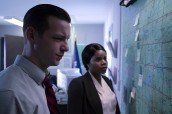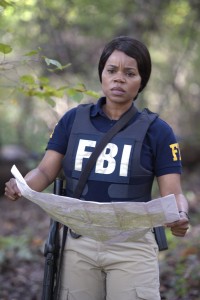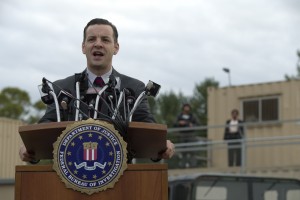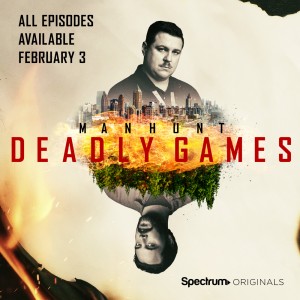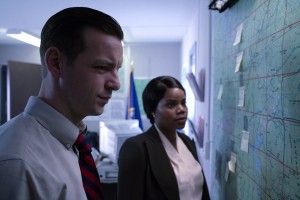MANHUNT: DEADLY GAMES tells two fact-based historic stories. One, recently dramatized in the feature film RICHARD JEWELL, chronicles the efforts of security guard Richard Jewell (played here by Cameron Britton) to clear his name after being wrongly accused of bombing Atlanta, Georgia’s Centennial Park during the 1996 Olympic Games. The other story is that of the actual bomber, Eric Rudolph (played by Jack Huston) and the FBI’s seven-year manhunt trying to capture him.
MANHUNT: DEADLY GAMES is the second season of the anthology series MANHUNT, which premiered in 2018 with a season about the Unabomber, Theodore Kaczynski. With MANHUNT: DEADLY GAMES, the series has moved to Spectrum Originals, available on demand to all Spectrum subscribers. All ten episodes of the season are being made available on Monday, February 3, for viewers who would like to binge.
Gethin Anthony and Kelly Jenrette play, respectively, FBI Special Agent Jack Brennan and FBI Special Agent Stacey Knox, in charge of the investigations into both Jewell and Rudolph. The characters are both composites of agents who worked the cases. Despite evidence repeatedly brought to them by an ATF bomb expert, played by Arliss Howard, it takes a long time for Brennan and Knox to come around to the notion that Rudolph may be the Centennial Park bomber.
Anthony, originally from Stratford-upon-Avon in England, is perhaps best known to American television viewers for playing would-be king Renly Baratheon in GAME OF THRONES and Charles Manson in two seasons of AQUARIUS. Jenrette, originally from Atlanta, earned an Emmy nomination for her guest performance in THE HANDMAID’S TALE and was a series regular on GRANDFATHERED. The two actors sit down together to talk about their work as partners in MANHUNT: DEADLY GAMES.
ASSIGNMENT X: Did either of you know much about this case beforehand?
KELLY JENRETTE: I knew a little bit about this case. I am originally from Atlanta, born and raised, and I have a picture of my mom, myself, and two of my brothers holding the [Olympic] torch, because they did the torch run that went past our house, and my youngest brother performed in the opening and closing ceremony. It hit very close to home. So I was excited to be able to tell this story. But I realized there was so much more that I didn’t know about this story, so I was grateful to be able to learn some stuff about it.
GETHIN ANTHONY: And having grown up a lot further away [laughs], I still was very surprised by how little I knew. I was about thirteen when it happened, and I remember something happening at the Olympics, but I guess I wasn’t so aware of the fallout of what happened afterwards. And I certainly didn’t know that Richard Jewell was innocent, and I certainly didn’t know that it took seven years to find the man responsible. So going on the story for me was a real journey of learning, really, and I’ve enjoyed it all the more for that.
AX: Now, it’s unusual in either a TV show or a film to have a protagonist who isn’t the bad guy, but who is so consistently wrong-headed as both of your characters are for quite awhile. Can you talk about playing that?
[Both Anthony and Jenrette laugh.]
ANTHONY: You’re so, so right. I mean, being inside the story was definitely tough at times, because I was reading the scripts, literally, physically, going, “No, no, no!” But it’s a really human thing. We should say, our characters, Jack Brennan and Stacey Knox, are composites of lots and lots of agents who did very hard work, and we know, it’s on record, that mistakes were made, very serious mistakes. So we represent all of that in our story. Knowing how it was going to end, I had to keep coming round to that, but yeah, it was very difficult at times.
JENRETTE: It was extremely difficult, largely in part because one, like he said, you know how it ends, and how just dead wrong they were. And then, on the acting side, we have this scene where we’re interrogating Richard Jewell. And Cameron just does such an amazing job playing him, and I found [myself as a real person] getting lost in the performance, and really feeling bad, and I had to say, “Don’t cry. You cannot cry. This is Stacey Knox, she believes that he did this horrible crime.” But it was frustrating because it’s like, if you could just take a step back, and look at things in a broader sense, maybe you would make some different choices.
ANTHONY: It was really interesting to look at. Cam’s performance is so full of heart and dignity, and I kind of played the same game of convincing myself, “No, he’s just a really good deceiver” in those early moments when we believe that he did it and that’s what our characters think. That was one of the great acting challenges on this, because Cam’s performance is just so full of heart.
AX: Prior to playing Richard Jewell in MANHUNT: DEADLY GAMES, Cameron Britton had played real-life serial killer Ed Kemper in MINDHUNTER. Did you guys watch his performance in MINDHUNTER to psych yourselves up and think, “Oh, beneath this calm exterior is a total psycho”?
[Both laugh.]
ANTHONY: No, but that would have been a really good tactic to go back to and watch those scenes with him. I didn’t think about doing that. Maybe we should have done that.
JENRETTE: Yeah. I did watch MINDHUNTER. He was so good in that. He’s amazing, the way he taps into everything.
AX: How was it doing your scenes with Arliss Howard as the ATF bomb expert who keeps trying to tell your characters what really happened?
JENRETTE: Arliss is incredible, and I remember the first scene that I had with him. I had to be very firm – I don’t want to say ‘mean,’ because that’s a judgment – and he’s just so locked in, he’s so present, and he’s so good, it was great being able to do scenes with him.
ANTHONY: I got to spend a lot of time with Arliss, and I learned a huge amount from him, and I just have very fond memories of this whole summer. I feel like, certainly, my character went on a huge journey, but I did personally, too. Well, mostly, it’s down to Kelly [laughs]. But we shared some amazing scenes with Arliss. And he was initially an enigma to me. But I grew to appreciate exactly what he was doing, and seeing it pay off in the show is just incredible.
AX: Stacey Knox is a composite, but she’s really much more what most people think of when we think of an FBI agent, where this person is going to be very stoic and matter-of-fact in front of the public …
JENRETTE: Yeah. It’s all about getting the job done, solving the case. It’s not about getting tied into or lost into the human being behind it, it’s, “I have a job to do, you seem to be the person that committed this crime, and what do we do to people that commit crimes? We lock them up.”
AX: Were there many, or any, black women in that position of authority at that time in the FBI?
JENRETTE: That was something that I really researched. There were, I believe there were three percent of African-Americans – not women, just African-Americans altogether during that time, and there was this huge lawsuit that had taken place in the early ‘90s, because of the discrimination that they had done, and so there weren’t very many African-Americans, and certainly not African-American women.
AX: How do the two of you balance the power dynamic between your two characters?
ANTHONY: We had a lot of discussions about that. Because we’re composites, and it felt to me, as it should be, as if we were partners a lot of the time. And then there were some details in the script where the hierarchal structure of the organization, [that it] was kind of a men’s atmosphere, kind of creeps in. For me, it felt weird but honest about the story we’re telling.
JENRETTE: Like Gethin said, we did have conversations about it, because initially, it felt like we were partners, and then I noticed that it felt like he was now my boss.
ANTHONY: You say “boss.”
JENRETTE: Yeah. I call you “boss,” and “sir,” and not like that Southern polite “Yes, sir,” “No, sir.” It felt like oh, he is my superior. But we had a saying on set, “Knox rocks,” because it’s true. [laughs] She was very much firm, but she even says in it, “I like being second in command,” because she doesn’t have to worry about compromising her integrity when her boss tells her to do something that she knows isn’t right. It’s just, “I have to follow the rules.” And that was okay with her.
AX: Because it seems like Knox is not that worried about impressing any one particular person, whereas Brennan is much more concerned about he’s impressing the higher-ups …
ANTHONY: Yeah. Well, he’s right in the firing line. There is one moment where, in a kind of an unexpected way, Kelly’s character Knox helps Brennan out by saying, “I’m glad I’m not in charge.” Because he does have this responsibility on his shoulders. And it’s kind of a different point, but it speaks to the hierarchal structure of these law enforcement agencies, what chain of command means. It’s not a comfortable position, to be responsible. But there are also elements of, the character Jack Brennan has a personal relationship with the Director of the FBI, who sees a little bit of him in him, so he’s kind of mentoring him, and so Brennan also feels a personal responsibility to not let him down. But it did make certain scenes between Kelly and I fascinating, sometimes uncomfortable, but as I say, occasionally it felt honest for the period and the story that we’re telling.
AX: Do your characters like each other?
JENRETTE: Yes. I believe, yeah. I think that Knox likes Brennan, and Brennan even, when Director Freeh puts him on a new case, he specifically requests to work with Knox again. And so I think that there is this camaraderie that we have where we do like each other. And I think that, as the series goes on, that is kind of challenged, but I think because they have that foundation of, “I like you as a person,” it makes the conflict even more rich, because it’s like, “But this isn’t who you are, this isn’t what you should be doing. I don’t understand.”
AX: It’s harder to do that with a friend than with somebody where you’re going, “Well, you’re a jackass anyway” …
JENRETTE: “I don’t like you.” Yeah.
ANTHONY: We had long, long conversations about what their particular history was. And I think something that kind of stands out in the show is that these are two characters – you see a teensy bit of family connection in Knox’s case, it’s talked about in my case, you slightly see it – but there are no partners, there’s just the job. And I think they see in each other, they’re not the same person, but they have in that, they are professionals and in their approach to work, they have a very extreme work environment, so I think those kind of understandings between two people, and also, I think they definitely like each other. I mean, she has his number, so I think he likes that.
AX: Did either of you have to learn how to do anything physically in order to play your parts, either how to handle particular types of weaponry, or how to shove your way through the woods, or …?
JENRETTE: Yeah, we had some really great people working with us, former FBI agents who worked with us in how to hold the gun properly. My father is a retired police officer, and so I am familiar with guns. He carries a gun to this day, because he still does security and different things. And even in knowing how to shoot a gun, we’d gone to the gun range a couple of times, but as far as how you maneuver, even physically, with a bent knee, and tactically, how you come into a house, and how you have to peel off, left, right, left, right, it was a lot of things that we had to learn.
ANTHONY: There’s an element of that preparation – I saw a lot of training videos before we joined up all together, and then, as Kelly said, we had some wonderful guys working with us to get to the detail, because really, all we’re looking to get across, especially because we’re playing composite characters, is the authenticity of the operations, and trying to get that instilled in the story as much as possible, because then I think you feel those things as an audience. And for us, it was fun to be exposed to new things. I’ve not shot guns very often. I have done a little bit, but certainly not handguns. So there was all that training.
AX: And is there anything tricky or fun about playing people in the ‘90s?
JENRETTE: Yeah, it’s the ‘90s. [laughs] The ‘90s was a fun time, and even though I was a teenager, just reminiscing on that time period, and thinking back to, “Oh, my gosh, I was there during the Olympics,” and how different is it today? I think there are a lot of similarities to the ‘90s that there are today.
ANTHONY: And the suits. Suits in the ‘90s apparently were the size of tents. I found it interesting. [laughs] No, I’m kidding. I mean, actually, I spoke to our costume designer last night and congratulated him on an amazing job, because he convinced me that the trousers were supposed to be like that. I was like, “I could fit a whole building in each leg.” But actually, when I saw our supporting artists walk in their costumes on our set of the Olympic park, I had a real shiver. It’s funny, because, yeah, it’s twenty-four years ago, and there’s something about our dress that does shift. If it were the ‘70s, you’d pick it out, if it were the ‘60s, you might pick it out, if it were the ‘50s, you’d definitely pick it out. But there’s now the ‘90s to me, I can say, “Oh, I can pick that out.” And the haircuts, when I saw them, I got a little bit of a shiver. Because it just reminded me of images I saw of the Olympic Games, and seeing how everybody looked back then, and what they wore, and what their hair was like, I guess, is all I’m saying. So that was kind of a fun thing. But the shiver kind of turned into, “Oh, we’re here to do something really serious about history,” and it kind of shocked me into place a little bit.
AX: I don’t think it’s too spoilery to say there’s a point where Brennan and Knox finally realize that Eric Rudolph and not Richard Jewell bombed Atlanta. What was that scene, or those scenes, of realization like to play?
JENRETTE: Tricky.
ANTHONY: [laughs] Very, very tricky. It was like a long build-up of mis-headed misdirection and mis-headed decisions, to the point where you just have to suck it up. And it has to do with – I think “confirmation bias” is the wrong phrase, but when you’re so far down the road, to really sit back and go, “No, we’ve been wrong this whole time” was a tricky, tricky thing, and ultimately, I don’t want to give any spoilers away, but we come at it from a slightly different, more personal angle, and I think that feels very human as well. Like when you’re faced with that utter vulnerability of that, oh, man, you reach out to people and want to learn more about them who are around you.
JENRETTE: Yeah. Gethin’s character came around first. My character Stacey Knox was very much like, “We have this open and closed. We’re done. It’s Richard Jewell. What are we talking about?” And so I think, going back to your question of, do we like each other, because we do like each other, and we have that relationship, I think there is something that Knox sees in Brennan, and admires that and respects it and ultimately trusts him. And it doesn’t hurt that the evidence is there to back it up, but I think their relationship helped to bring Stacey Knox around to the fact that it wasn’t Richard Jewell.
AX: To ask briefly about GAME OF THRONES, you were in the first two seasons. Were you sort of glad you got out by the time of the extremely controversial series ending?
[Both laugh.]
ANTHONY: Well, quite honestly, I feel so lucky just to have been a very small part of that whole huge phenomenon. And there’s a little bit of me, I’ll be honest, it’s nice being there at the start. Because back then, it was a pretty magical time. I would have loved to have been there at the end, don’t get me wrong, but it was kind of nice that Renly was out of all that. I watched it, like the fans did, live, and I found it exciting. I think there are two billion different versions of how that show could have ended, because I think every single person has their own way they would have done it, and that’s a credit to how complicated the books were, the breadth of [GAME OF THRONES creator] George [R.R. Martin]’s imagination, and how much story they were able to pack into it. So yeah. But maybe it was good to be out of the firing line a little bit [laughs].
AX: And what would you both most like people to know about MANHUNT: DEADLY GAMES?
JENRETTE: A lot of things. One, that it’s absolutely worth watching. And it’s a story about redemption, forgiveness, failures, heroes, unlikely heroes, and ultimately relationships.
ANTHONY: Seeking to understand how these things happen. And in order to do that, in order to understand that, we’ve constructed kind of a thrill ride through an investigation that was messy in places, and complicated, but it’s got these central characters who lived these human stories, and they have their ups and their downs, and we come out at the end with a better understanding of how it happened.
This interview was conducted during Spectrum Originals’s portion of the Winter 2020 Television Critics Association (TCA) press tour.
Follow us on Twitter at ASSIGNMENT X
Like us on Facebook at ASSIGNMENT X
Article Source: Assignment X
Article: Exclusive Interview with MANHUNT: DEADLY GAMES stars Gethin Anthony and Kelly Jenrette
Related Posts:




